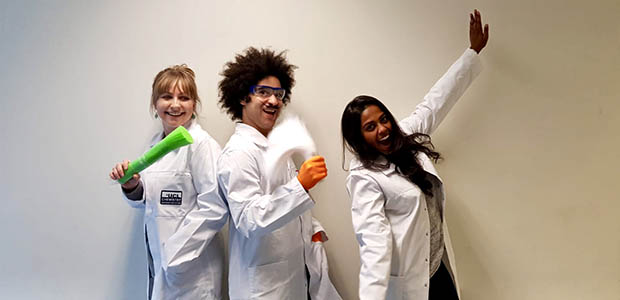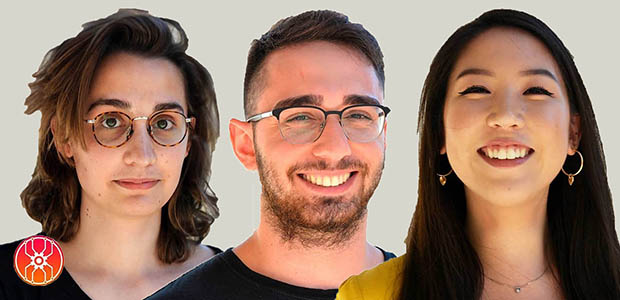Our 2019 finalists for the Bright SCIdea Challenge have been selected!
On Tuesday 19 March 2019, our shortlisted teams will enjoy a series of expert talks before pitching their science-based innovation to our panel of judges. The teams and other guests from across SCI’s network will also have the opportunity to meet with prominent industry figures on the day.
This year, after a number of high-quality submissions, SCI has invited five more teams to present their SCIdea in a poster competition, which will run throughout the day.
The best pitch will win £5,000!
Here are our 2019 finalists:
TEAM 1: DayDreamers
- Dominika Woszczyk – MSc Artificial Intelligence, University of Southampton
- Diane Remmy – BSc Electrical and Electronic Engineering, University of Bristol
- Raffaele Piccini – MSc Artificial Intelligence, University of Edinburgh
Describe your product or service in one line.
An app that takes you on a journey to a better mental health along with an AI powered chatbot as your companion.
Why did you enter the Bright SCIdea Challenge?
We are a team of enthusiastic students that are driven by the desire to use our knowledge and skills to improve people's lives. This challenge was a great opportunity for us to hone our business skills and practice the process of developing an idea for a potential start-up, while also validating it. We have been involved in similar challenges before, but they all focused on pitching an idea and not building a thorough business plan that is backed up by real facts and research. This challenge was the occasion for us to step up our game.
TEAM 2: BRISL Antimicrobials
- Georgia Fleet – All EngD Molecular Modelling and Materials Science, UCL
- Sriluxmi Srimurugananthan
- Claudio Lourenco
Describe your product or service in one line.
Light-activated antimicrobial bristles, with an initial focus on toothbrush bristles.
Why did you enter the Bright SCIdea Challenge?
A lot of scientific research focuses on the ‘big questions’: Can we cure cancer? How did life begin? What is dark matter? Although these questions are important, BRISL Antimicrobials has a passion for research that is more downstream and has the potential to have positive real-world effects now. From our combined industrial experience, we realise the importance of multidisciplinary teams, moreover the need for a better bridge between scientists and entrepreneurs when generating successful products.
BRISL Antimicrobials are first and foremost scientists at heart, who wanted to take the next steps in bridging the gap between science and business. We thought we had a Bright SCIdea, so why not enter!
TEAM 3: Plastech Innovation
- Natasha Boulding – Soft Matter & Functional Interfaces CDT, All Durham
- Philip Buckley – Soft Matter & Functional Interfaces CDT
- Scott Bush – PhD Chemistry
Describe your product or service in one line.
Plastech Innovation is reducing the volume of plastic waste entering our natural environment by processing it into novel aggregate for use in concrete.
Why did you enter the Bright SCIdea Challenge?
As scientists with a business idea, we wanted to learn how we could get such an idea from lab to market. The training Bright SCIdea has provided has helped to work towards achieving this. Also, the £5,000 would help to upgrade some equipment, which will allow us to start working with a local concrete company to optimise our aggregate and help get our product into the real world.
TEAM 4: Seta
- Catherine Fan – MSci Biological Sciences, All UCL
- Eloise Nee – Msci Natural Sciences
- Giovanni Maddalena – MRes Synthetic Biology
Describe your product or service in one line.
A high-throughput synthetic biology approach to the design and testing of biomaterials for tissue engineering applications.
Why did you enter the Bright SCIdea Challenge?
From mid-2018, we all participated in iGEM – an international synthetic biology competition held in Boston every year. Our project revolved around spider silk biomaterials. As spider silk is notoriously difficult to spin, we developed a novel polymerisation technology that has the versatility to enable other biomaterial production. During iGEM, we noticed many successful companies working on biomaterials, and envisioned equal success with our product. We signed up to the Bright SCIdea Challenge to gain the skills necessary to initiate the entrepreneur starting point for commercialising our research.
TEAM 5: OxiGen
- Morganne Wilbourne – Biomolecular Science, All University of St Andrews
- Gavin Lamb – Experimental Physics
- James Hammond – Mathematics and Biology
- Graeme Joel – Management
Describe your product or service in one line.
Our concept is for a designer cell line, optimised for protein expression using characteristics derived from both prokaryotic and human cells.
Why did you enter the Bright SCIdea Challenge?
When we heard about Bright SCIdea, it seemed like it would be an excellent way to expand our horizons into the world of business and give us a better understanding of real-world applications of science that we have studied. Furthermore, the opportunity to meet and create connections with some of the people involved in this project was incredibly appealing. Networking is paramount to success in the business sector, so this was a chance we didn’t want to pass up. Using our collectively diverse background knowledge, we were able to create a business plan with low risk and a substantial output.


